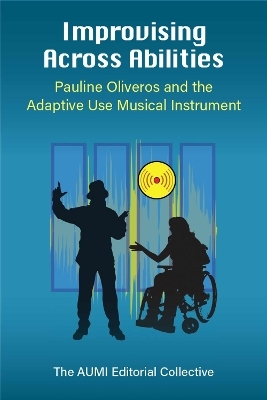
Improvising Across Abilities
The University of Michigan Press (Verlag)
978-0-472-07573-7 (ISBN)
Improvising Across Abilities: Pauline Oliveros and the Adaptive Use Musical Instrument (AUMI) brings together scholars, musicians, and family members of people with disabilities to collectively recount years of personal experiences, research, and perspectives on the societal and community impact of inclusive musical improvisation. One of the lesser-known projects of composer, improviser, and humanitarian, Pauline Oliveros (1932–2016), the AUMI was designed as a liberating and affordable alternative to the constraints of instruments created only for normative bodies, thus opening a doorway for people of all ages, genders, abilities, races, and socioeconomic backgrounds to access artistic practice with others. More than a book about AUMI, this book is an invitation to readers to use AUMI in their own communities.
This book, which contains wisdom from many who have been affected by their work with the instrument and the people who use it, is a representation of how music and extemporized performance have touched the lives and minds of scholars and families alike. Not only has AUMI provided the opportunity to grow in listening to others who may speak differently (or not at all), but it has been used as an avenue for a diverse set of people to build friendships with others whom they may have never otherwise even glanced at in the street. By providing a space for every person who comes across AUMI to perform, listen, improvise, and collaborate, the continuing development of this instrument contributes to a world in which every person is heard, welcomed, and celebrated.
The AUMI Editorial Collective includes Thomas Ciufo, Abbey Dvorak, Kip Haaheim, Jennifer Hurst, IONE, Grace Shih-en Leu, Leaf Miller, Ray Mizumura-Pence, Nicola Oddy, Jesse Stewart, John Sullivan, Sherrie Tucker, Ellen Waterman, and Ranita Wilks.
Introduction
Section I: Dreaming of AUMI
Chapter 1
Going Deep: AUMI Since Before the Beginning
Leaf Miller
Illustrations by Ty Dykema
Chapter 2
From Punk Philosophy to Musical Accessibility
Zane Van Dusen
Chapter 3
My Transformation into a Masterpiece Musical Instrument and Musician
Clara Tomaz
Chapter 4
The Gift of Expression: Playing AUMI with My Son
Julie Brocklehurst
Chapter 5
AUMI as a Model for Social Justice
George Lipsitz
Chapter 6
The Dream of AUMI
IONE
Section II: Software for All People: Improvising AUMI’s Development
Chapter 7
AUMI in the Context of Adaptive Music
Alex Lubet
Chapter 8
AUMI Among the ADMIs: The Adaptive Digital Context
Grace Shih-en Leu
Chapter 9
AUMI Development and Developers: The DLI Years (2007-2012)
Sherrie Tucker
Chapter 10
AUMI Technology Development at McGill (2012-2019)
John Sullivan, Ivan Franco, Ian Hattwick, Thomas Ciufo, Eric Lewis
Chapter 11
How Adaptive, How Useful? Technological Design Solutions in AUMI for iOS
Henry Lowengard
Chapter 12
Pauline’s World of Virtuosos: Expanded Instruments, Deep Listening, and Stretched Boundaries
Jonas Braasch
Section III, Part 1:AUMI Communities
Chapter 13
Exploring AUMI’s Potential in the Thunder Bay Community
An Interview between Nicola Oddy and Lise Vaugeois
Chapter 14
Building and Sustaining Ethical Communities Together
An Interview with Rebecca Caines by Ellen Waterman
Chapter 15
There’s No Place Like AUMI: Building a Community Partnership in Lawrence, Kansas
Jim Barnes, Kip Haaheim, Ray Mizumura-Pence, Sherrie Tucker, and Ranita Wilks
Chapter 16
Love, Actually: Using AUMI to Transgress Ableist Directing Habits
Nicole Hodges Persley
Chapter 17
Wooden Snapdragon
Julie Unruh
Chapter 18
Improvising Inclusive Communities: Shared Reflections on the Jesse Stewart Residency in Lawrence, Kansas
Abbey Dvorak, Kip Haaheim, Ray Mizumura-Pence, and Sherrie Tucker
Chapter 19
Sending and Receiving: AUMI Bodies and Dance Improvisation
Michelle Heffner Hayes and Sherrie Tucker
Chapter 20
Communities of Generosity and Gratitude: AUMI-KU InterArts’ First Decade
Ray Mizumura-Pence
Section III, Part 2:AUMI Performance
Chapter 21
WAAM + AUMI: The We Are All Musicians Project and the Adaptive Use Musical Instrument
Jesse Stewart
Chapter 22
“To Me, Dance is a Home”: An Interview with Jessie Huggett
Jessie Huggett Interviewed by Jack Hui Litster
Chapter 23
“I Am Here”: AUMI Sings and Choral Participation
Ellen Waterman, Laurel Forshaw, Gillian Siddall, Henry Lowengard, Gale Franklin, Teresa Connors, and Karen Berglander
Chapter 24
AUMI, Theremin, and Sonic Witnessing
Li Harris
Chapter 25
AUMI in Practice: The Mills AIE
Matt Robidoux
Chapter 26
Knowing as Feeling: Five Meditations on the Planets
Kip Haaheim
Section IV, Part 1: AUMI Classrooms
Jennifer Hurst and Grace Shih-en Leu
Chapter 27
Working with AUMI in Classroom Settings in a Center School for Students with Severe Cognitive and Physical Challenges
Deborah A. Nelson and Nancy Patterson
Chapter 28
AUMI and ‘Improvise Approach’ Backing Tracks
Carrie Lennard
Chapter 29
AUMI and the Ethics of Technology: A Personal Encounter
Eric Lewis
Section IV, Part 2: AUMI and Music Therapy: Supporting Independent Musicking
Abbey Dvorak and Nicola Oddy
Chapter 30
Clinical Applications Using AUMI in Music Therapy Practice
Abbey L. Dvorak, James Maxson, and David Knott
Chapter 31
Use of AUMI in Clinical Music Therapy for Hospitalized Patients with Complex Neurological Disabilities
Sergio Hazard
Chapter 32
AUMI and Musical Empowerment in a Pediatric Environment
John Mulcahy
Section V: Dreaming AUMI Futures
Chapter 33
Dream Music
Julie Unruh
Chapter 34
Dreaming AUMI’S Future
IONE
References
Editorial Team and Chapter Contributors
| Erscheinungsdatum | 06.02.2024 |
|---|---|
| Reihe/Serie | Music and Social Justice |
| Zusatzinfo | 27 illustrations, 2 tables, 3 sound files, 24 vide |
| Verlagsort | Ann Arbor |
| Sprache | englisch |
| Maße | 152 x 229 mm |
| Gewicht | 272 g |
| Themenwelt | Kunst / Musik / Theater ► Musik ► Musiktheorie / Musiklehre |
| Sozialwissenschaften ► Soziologie | |
| ISBN-10 | 0-472-07573-X / 047207573X |
| ISBN-13 | 978-0-472-07573-7 / 9780472075737 |
| Zustand | Neuware |
| Haben Sie eine Frage zum Produkt? |
aus dem Bereich


